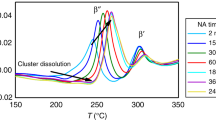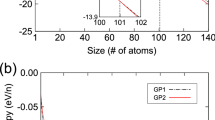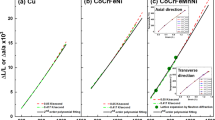Abstract
AN anomalous increase in resistivity has been observed during formation of G. P. zones (clusters rich in solute) in several aluminium alloys1,2. Mott3 suggested that this effect may be due to a critical scattering of the conduction electrons when the zone grows to dimensions of the wave-length of the conduction electrons. Matyas4 showed on theoretical grounds that a maximum should occur for the resistivity change during zone formation.
This is a preview of subscription content, access via your institution
Access options
Subscribe to this journal
Receive 51 print issues and online access
$199.00 per year
only $3.90 per issue
Buy this article
- Purchase on Springer Link
- Instant access to full article PDF
Prices may be subject to local taxes which are calculated during checkout
Similar content being viewed by others
References
Federighi, T., and Passari, L., Acta Met., 7, 422 (1959).
Gayler, M. L. V., J. Inst. Metals, 60, 249 (1937).
Mott, N. F., J. Inst. Metals, 60, 267 (1937).
Matyas, Z., Phil. Mag., 40, 324 (1949).
Panseri, C., and Federighi, T., Acta Met., 8, 217 (1960).
Guinier, A., Ann. Phys. (Paris), 12, 90 (1939).
Author information
Authors and Affiliations
Rights and permissions
About this article
Cite this article
HERMAN, H., COHEN, J. Resistivity Changes due to Formation of G. P. Zones (Clusters rich in Solute). Nature 191, 63–64 (1961). https://doi.org/10.1038/191063a0
Issue Date:
DOI: https://doi.org/10.1038/191063a0
This article is cited by
-
Altering the time cycle of heat treatment by quenched-ln vacancies
Metallurgical Transactions (1971)
Comments
By submitting a comment you agree to abide by our Terms and Community Guidelines. If you find something abusive or that does not comply with our terms or guidelines please flag it as inappropriate.



